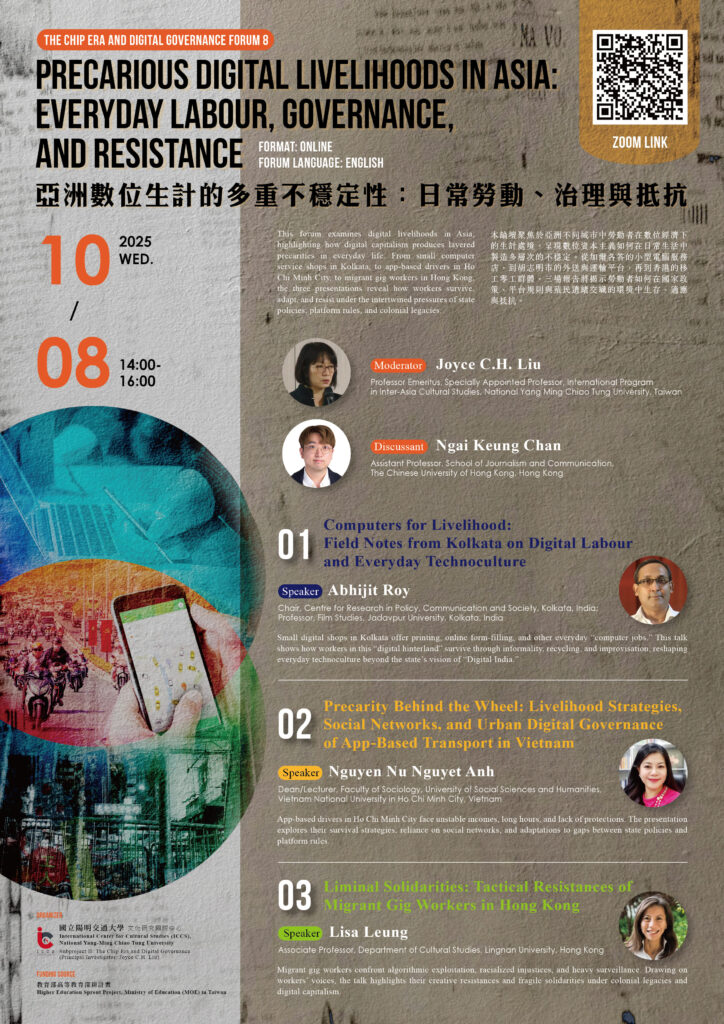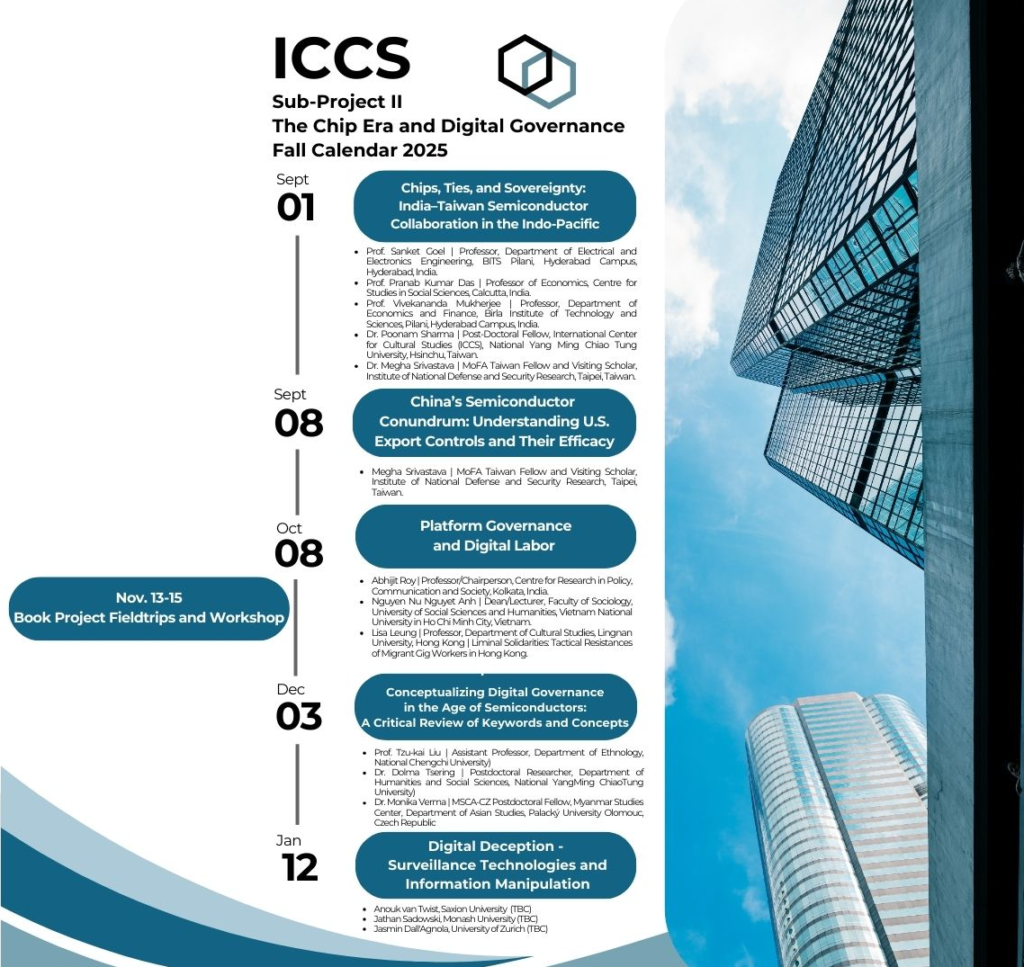
Octorber | Precarious Digital Livelihoods in Asia: Everyday Labour, Governance, and Resistance
🌐亞洲數位生計的多重不穩定性:日常勞動、治理與抵抗
The Chip Era and Digital Governance Forum 8
📌Date and Time: October 8, 2025, 14:00–16:00 Taipei Time (GMT+8)
📌Format: Online
📌Zoom Link: https://us02web.zoom.us/j/81427725027?pwd=t7Dqu44YirVEKCZ4zEtzwGrSHqhXg2.1
📌Forum Language: English
📌Synopsis
This forum examines digital livelihoods in Asia, highlighting how digital capitalism produces layered precarities in everyday life. From small computer service shops in Kolkata, to app-based drivers in Ho Chi Minh City, to migrant gig workers in Hong Kong, the three presentations reveal how workers survive, adapt, and resist under the intertwined pressures of state policies, platform rules, and colonial legacies.
本論壇聚焦於亞洲不同城市中勞動者在數位經濟下的生計處境,呈現數位資本主義如何在日常生活中製造多層次的不穩定。從加爾各答的小型電腦服務店,到胡志明市的外送與運輸平台,再到香港的移工零工群體,三場報告將揭示勞動者如何在國家政策、平台規則與殖民遺緒交織的環境中生存、適應與抵抗。
Computers for Livelihood: Field Notes from Kolkata on Digital Labour and Everyday Technoculture
💭Abhijit Roy
Chair, Centre for Research in Policy, Communication and Society, Kolkata, India; Professor, Film Studies, Jadavpur University, Kolkata, India
This presentation examines the unique case of non-platform digital work, often marginalized in digital labour discourse dominated by platform labour, gig work, or users’ big data. Focusing on Kolkata’s small shops providing digital services—ranging from DTP tasks (notices, posters, banners, cards, legal documents, school projects) to everyday “computer jobs” like printing, filling online forms, and ID renewals—the paper highlights labour marked by informality: job-based payment; lack of contracts, minimum wage, or social security; workplace risks; cheap Chinese hardware; “jugaad”; piracy; and absence of training or unionism. Based on interviews and audiovisual documentation, this research-in-progress explores a “digital hinterland” where recycling and piracy interrogate digital capitalism’s emphasis on obsolescence and IP, and where notions of art, skill, authorship, labour and innovation, under the Indian state’s corporate vision of “Digital India”, reorient themselves in relation to the sub-local geographies of everyday technoculture.
Precarity Behind the Wheel: Livelihood Strategies, Social Networks, and Urban Digital Governance of App-Based Transport in Vietnam
💭Nguyen Nu Nguyet Anh
Dean/Lecturer, Faculty of Sociology, University of Social Sciences and Humanities, Vietnam National University in Ho Chi Minh City, Vietnam
In Vietnam’s rapidly expanding platform economy, most app-based vehicle drivers work in informal conditions: lacking full protection under the Labor Code, excluded from mandatory insurance, subject to algorithmic management, and facing income instability, long hours, and safety risks. Ho Chi Minh City, as the economic hub and a convergence point for migrant workers, highlights these dynamics. Using Standing’s precarious work framework, Social Network Theory, and digital urban governance, this study draws on interviews and observations of drivers and team leaders. It analyzes drivers’ livelihood strategies, multi-platform order optimization, and peak-hour tactics, while exploring how social networks (online/offline) provide informational, financial, and emotional support, reduce isolation, and aid in emergencies. It also examines regulatory gaps between state policies and platform rules, showing how drivers adapt. It contributes to understanding the intersection of livelihoods, social connections, and digital urban governance in Vietnam’s digital economy.
Liminal Solidarities: Tactical Resistances of Migrant Gig Workers in Hong Kong
💭Lisa Leung
Associate Professor, Department of Cultural Studies, Lingnan University, Hong Kong
Migrant gig workers face multiple layers of ‘precarities’, from algorithmized labour exploitation to racialized injustices, especially in platform delivery work. In Asia, colonial legacy complicates both the composition of migrant gig workers and the aggressions against them, while solidarity and organized resistance remain challenged under intensified surveillance. Focusing on Hong Kong, this lecture examines how colonialism and capitalism together enforce a surplus logic against racialised minorities, now embedded in the platform algorithmized economy. Drawing on surveys and interviews with South Asian migrant and minority workers, it highlights their affective responses to discrimination and the creative forms of resistance they develop. It further addresses the dynamics and difficulties of gig labour solidarity under heightened platform and state surveillance.
📌Moderator
💭Joyce C.H. Liu
Professor Emeritus, Specially Appointed Professor,
International Program in Inter-Asia Cultural Studies,
National Yang Ming Chiao Tung University, Taiwan
📌Discussant
💭Ngai Keung Chan
Assistant Professor,
School of Journalism and Communication,
The Chinese University of Hong Kong, Hong Kong
📌Organizer
國立陽明交通大學文化研究國際中心 International Center for Cultural Studies (ICCS), National Yang Ming Chiao Tung University
- Subproject II: The Chip Era and Digital Governance (Principal Investigator: Joyce C.H. Liu)
📌Funding Source
教育部高等教育深耕計畫 Higher Education Sprout Project, Ministry of Education (MOE) in Taiwan






